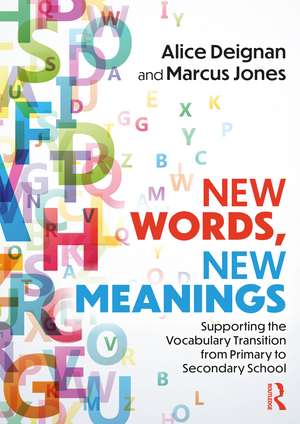New Words, New Meanings: Supporting the Vocabulary Transition from Primary to Secondary School
Autor Alice Deignan, Marcus Jonesen Limba Engleză Paperback – 3 dec 2024
Based on a major research project, this book explains the nature of the language challenge students face in early secondary school and shows teachers how they can make the language of their subject less daunting and more accessible for all students. Chapters explore the language of the classroom at Key Stage 2 and Key Stage 3 using written and spoken language data from everyday classrooms. Including subject specific word lists and contextual examples for English, maths, science, history and geography, chapters cover:
• How language use is shaped by topic, context, relationships and purpose
• The language features of early secondary school
• Key principles for selecting vocabulary to teach
• Supporting pupils with disciplinary grammar and style
• Ensuring a whole-school approach to language issues
Full of practical tips to make the language of curriculums less daunting and more accessible for all students making the transition from primary to secondary school, this book will be valuable reading for teachers, educational support staff and school leaders working with children in late primary and early secondary school.
| Toate formatele și edițiile | Preț | Express |
|---|---|---|
| Paperback (1) | 145.91 lei 22-36 zile | +10.10 lei 5-11 zile |
| Taylor & Francis – 3 dec 2024 | 145.91 lei 22-36 zile | +10.10 lei 5-11 zile |
| Hardback (1) | 934.84 lei 43-57 zile | |
| Taylor & Francis – 3 dec 2024 | 934.84 lei 43-57 zile |
Preț: 145.91 lei
Nou
Puncte Express: 219
Preț estimativ în valută:
27.93€ • 30.35$ • 23.48£
27.93€ • 30.35$ • 23.48£
Carte disponibilă
Livrare economică 31 martie-14 aprilie
Livrare express 14-20 martie pentru 20.09 lei
Preluare comenzi: 021 569.72.76
Specificații
ISBN-13: 9781032645469
ISBN-10: 1032645466
Pagini: 154
Ilustrații: 8
Dimensiuni: 174 x 246 x 12 mm
Greutate: 0.26 kg
Ediția:1
Editura: Taylor & Francis
Colecția Routledge
Locul publicării:Oxford, United Kingdom
ISBN-10: 1032645466
Pagini: 154
Ilustrații: 8
Dimensiuni: 174 x 246 x 12 mm
Greutate: 0.26 kg
Ediția:1
Editura: Taylor & Francis
Colecția Routledge
Locul publicării:Oxford, United Kingdom
Public țintă
Postgraduate and Professional Practice & DevelopmentNotă biografică
Alice Deignan is Professor of Applied Linguistics at the School of Education, University of Leeds. Her research uses specialist computer software to analyse language. She has studied the academic languages of school, comparing years, key stages and disciplines.
Marcus Jones is a secondary English teacher and experienced middle leader. He is also the literacy lead for Huntington Research School, part of the Education Endowment Foundation’s Research School Network. He has delivered literacy training and support to primary and secondary schools across the country.
Marcus Jones is a secondary English teacher and experienced middle leader. He is also the literacy lead for Huntington Research School, part of the Education Endowment Foundation’s Research School Network. He has delivered literacy training and support to primary and secondary schools across the country.
Cuprins
Introduction
Chapter 1 - A change of focus: From child to disciplinary student
Chapter 2 - Language at secondary school: New registers, new words
Chapter 3 - The academic vocabulary of early secondary school
Chapter 4 - Vocabulary across subjects
Chapter 5 - Polysemy: New meanings for old words
Chapter 6 - Words in combination and context
Chapter 7 - Selecting and teaching
Chapter 8 - Making words work in the classroom
Chapter 9 - Conclusion
Appendix 1: The general academic vocabulary of KS3
Appendix 2: Polysemous words
Chapter 1 - A change of focus: From child to disciplinary student
Chapter 2 - Language at secondary school: New registers, new words
Chapter 3 - The academic vocabulary of early secondary school
Chapter 4 - Vocabulary across subjects
Chapter 5 - Polysemy: New meanings for old words
Chapter 6 - Words in combination and context
Chapter 7 - Selecting and teaching
Chapter 8 - Making words work in the classroom
Chapter 9 - Conclusion
Appendix 1: The general academic vocabulary of KS3
Appendix 2: Polysemous words
Descriere
Based on a major research project, this book explains the nature of the language challenge students face in early secondary school and shows teachers how they can make the language of their subject less daunting and more accessible for all students.
